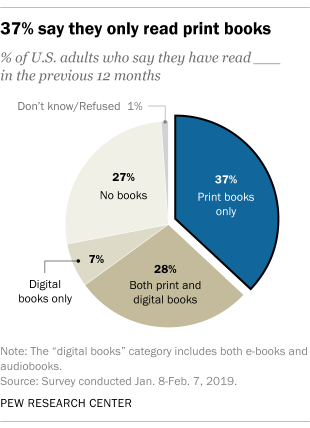One-in-five Americans now listen to audiobooks

One-in-five Americans now listen to audiobooks
Americans are spreading their book consumption across several formats, and the use of audiobooks is on the rise.
 Roughly seven-in-ten U.S. adults (72%) say they have read a book in the past 12 months in any format, a figure that has remained largely unchanged since 2012, according to a Pew Research Center survey conducted Jan. 8-Feb. 7, 2019. Print books remain the most popular format for reading, with 65% of adults saying they had read a print book in the year before the survey.
Roughly seven-in-ten U.S. adults (72%) say they have read a book in the past 12 months in any format, a figure that has remained largely unchanged since 2012, according to a Pew Research Center survey conducted Jan. 8-Feb. 7, 2019. Print books remain the most popular format for reading, with 65% of adults saying they had read a print book in the year before the survey.
And while shares of print and e-book readers are similar to those from a Center survey conducted in 2016, there has been an uptick in the share of Americans who report listening to audiobooks, from 14% to 20%.
Overall, Americans read an average (mean) of 12 books per year, while the typical (median) American has read four books in the past 12 months. Each of these figures is largely unchanged since 2011, when the Center first began conducting the surveys of Americans’ book reading habits.
 Despite some growth in certain digital formats, it remains the case that relatively few Americans only consume digital books (which include audiobooks and e-books) to the exclusion of print. Some 37% of Americans say they read only print books, while 28% read in these digital formats and also read print books. Just 7% of Americans say they only read books in digital formats and have not read any print books in the past 12 months. (About a quarter of Americans haven’t read a book in any format in the past year.)
Despite some growth in certain digital formats, it remains the case that relatively few Americans only consume digital books (which include audiobooks and e-books) to the exclusion of print. Some 37% of Americans say they read only print books, while 28% read in these digital formats and also read print books. Just 7% of Americans say they only read books in digital formats and have not read any print books in the past 12 months. (About a quarter of Americans haven’t read a book in any format in the past year.)
Demographic differences in book reading in 2019 are similar to the patterns seen in past Center surveys. For example, adults with a bachelor’s or advanced degree are more likely to be book readers than those who have only attended some college, high school graduates and those with less than a high school education. And adults ages 18 to 29 are more likely to read books than those 65 and older. At the same time, some groups have become more or less likely to read books in certain formats than was true in 2018. Some examples include:
College graduates – The share of college graduates who have listened to an audiobook in the past 12 months has increased 7 percentage points since 2018. About one-third of college graduates (34%) have done this in the past 12 months, compared with 27% in 2018.

More affluent adults – Similarly, the share of adults with an annual household income of $75,000 or more who have listened to an audiobook has increased 7 percentage points since 2018 (30% vs. 23%).
Men – While book reading among other demographic groups has increased since 2018, men are less likely now to report as book readers: 67% of men in the current survey say they have read a book in the past 12 months, compared with 73% in 2018.
Note: See full topline results and methodology here. This is an update of a post originally published March 8, 2018.


